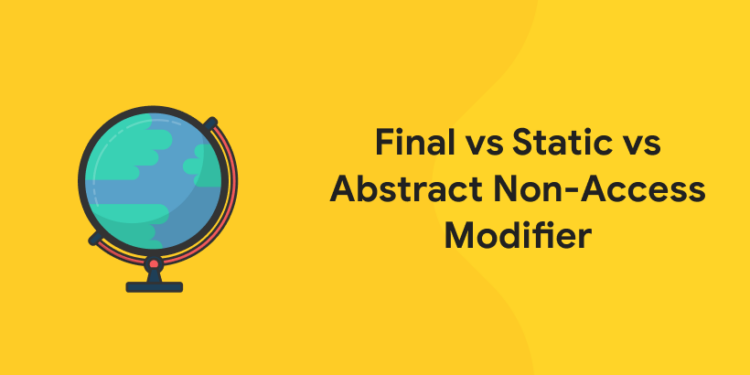Table of Contents
Modifiers are specific keywords present in Java using that we can make changes to the characteristics of a variable, method, or class and limit its scope. Java programming language has a rich set of Modifiers. Modifiers in Java are divided into two types
To know more about Java, Download Entri App!
- Access Modifiers
- Non-Access modifiers
Non-access modifiers provide information about the characteristics of a class, method, or variable to the JVM. Seven types of Non-Access modifiers are present in Java. They are
- static
- final
- abstract
- synchronized
- volatile
- transient
- native
Final Non-Access Modifier
The final non-access modifier is applicable to classes, methods, and variables. If we declare a parent class method as final then we can’t override that method in the child class because its implementation is final and if a class is declared as final we can’t extend the functionality of that class i.e we can’t create a child class for that class i.e inheritance is not possible for final classes. Every method present inside the final class is always final y default but every variable present inside the final class need not be final. The main advantage of the final keyword is we can achieve security and we can provide a unique implementation. But the main disadvantage of the final keyword is we are missing key benefits of OOPs like Inheritance(Because of the final class), Polymorphism(Because of the final method) hence if there are no specific requirements then it is not recommended to use the final keyword.
Learn to code from industry experts! Enroll here!
Example 1:
- Java
| // Java Program to illustrate Final keyword
// Where No final keyword Is Used
// Importing required classes import java.io.*; import java.util.*;
// Class 1 // Super-class class P {
// Method 1 // To declare first name public void firstName() {
// Passing name and print it System.out.println(“Mayank”); }
// Method 2 // To declare last name public void surName() {
// Passing name and print it System.out.println(“Trivedi”); } }
// Class 2 // Sub-class // Extending above class class C extends P {
// Method 1 // Trying to override the last name public void surName() { // Display surname System.out.println(“Sharma”); }
// Method 2 // Main driver method public static void main(String[] args) {
// Display message System.out.println(“GFG”); } } |
Output:
GFG
Static Non-Access Modifier
1: What is the default value of a boolean in Java?
The static non-access modifier is applicable for methods and variables but not for classes. We can declare a top-level class with a static modifier but we can declare the inner class as static (such types of inner classes are known as static nested classes). In the case of instance variable for every object, a separate copy will be created but in the case of static variable, a single copy will be created at class level and shared by every object of that class.
Example:
- Java
| // Java Program to Illustrate Static Access Modifier
// Importing required classes import java.io.*; import java.util.*;
// Main class class GFG {
// Creating a static variable and // initializing a custom value static int x = 10;
// Creating a instance variable and // initializing a custom value int y = 20;
// Main driver method public static void main(String[] args) {
// Creating an object of class inside main() method GFG t1 = new GFG();
// Accessing and re-initializing the // static and instance variable // using t1 reference t1.x = 888; t1.y = 99;
// Creating an object of class inside main() method // again GFG t2 = new GFG();
// Accessing the static and instance variable using // t2 reference as we know that for each object // there is separate copy of instance variable // created. While same copy of static variable will // be shared between the objects
// Displaying the value of static and instance // variable using t2 object reference System.out.println( “Value of Static variable x = ” + t2.x + “\n” + “Value of Instance variable y = ” + t2.y); } } |
Learn to code from industry experts! Enroll here!
Abstract Non-Access Modifier
The abstract non-access modifier is applicable only for classes and methods but not for variables. If we declare any method as abstract then that method must have its implementation in the child class of the respective class because abstract methods never talk about implementation. If any modifier talks about implementation then it forms an illegal combination with an abstract modifier. In a similar way if for any java class if we are not allowed to create an object (because of partial implementation) then such type of class we have to declare with abstract modifier.
Example:
- Java
| // Java program to illustrate Abstract Access Modifier
// Importing the required packages import java.io.*; import java.util.*;
// Class 1 // Helper abstract class abstract class Vehicle {
// Declaring an abstract method getNumberOfWheel abstract public int getNumberOfWheel(); }
// Class 2 // Helper class extending above abstract class class Bus extends Vehicle {
// Giving the implementation // to the parent abstract method public int getNumberOfWheel() { return 7; } }
// Class 3 // Helper class extending above abstract class class Auto extends Vehicle {
// Giving the implementation // to the parent abstract method public int getNumberOfWheel() { return 3; } }
// Class 4 // Main class public class GFG {
// Main driver method public static void main(String[] args) {
// Creating Bus object Bus b = new Bus();
// Creating Auto object Auto a = new Auto();
// Now getting and displaying // the number of wheels // for Bus by calling the // getNumberOfWheel method System.out.println(“Number of wheels in bus is” + ” ” + b.getNumberOfWheel());
// Now getting and displaying // the number of wheels // for Auto by calling the // getNumberOfWheel method System.out.println(“Number of wheels in Auto is” + ” ” + a.getNumberOfWheel()); } } |
Output:
Difference Table
| Final Non-Access Modifier | Static Non-Access Modifier | Abstract Non-Access Modifier |
| This modifier is applicable to both outer and inner classes. | This modifier is not applicable to outer classes. | This modifier is applicable to both outer and inner classes. |
| This modifier is not applicable to interfaces | This modifier is not applicable to interfaces. | This modifier is applicable to interfaces. |
| This modifier is the only modifier that is applicable for local variables. | This modifier is not applicable for local variables. | This modifier is not applicable for local variables. |
| Final method can’t be inherited. | Static methods can only access the static members of the class and can only be called by other static methods. | Abstract method can be inherited. |
Java provides a number of non-access modifiers to achieve many other functionalities.
- The static modifier for creating class methods and variables.
- The final modifier for finalizing the implementations of classes, methods, and variables.
- The abstract modifier for creating abstract classes and methods.
- The synchronized and volatile modifiers, which are used for threads.
To know more about Java, Download Entri App!
Why is it important to choose Entri?
- Excellent online platform for all the Competitive Exams.
- Provides updated materials created by the Entri Experts.
- Entri provides a best platform with full- length mock tests including previous year question papers.
- You can download the app for free and join the required classes.
- Entri wishes you all the best for your examinations and future endeavours.
“YOU DON’T HAVE TO BE GREAT TO START, BUT YOU HAVE TO START TO BE GREAT.”











